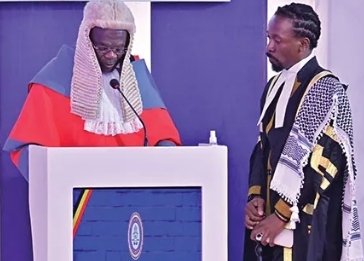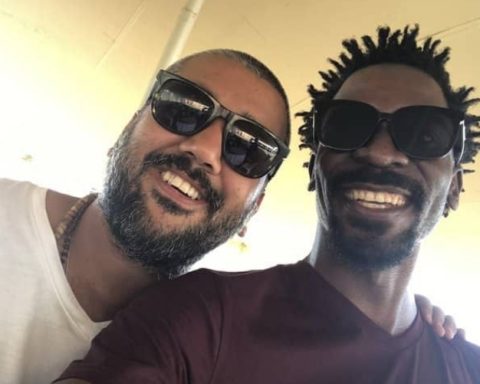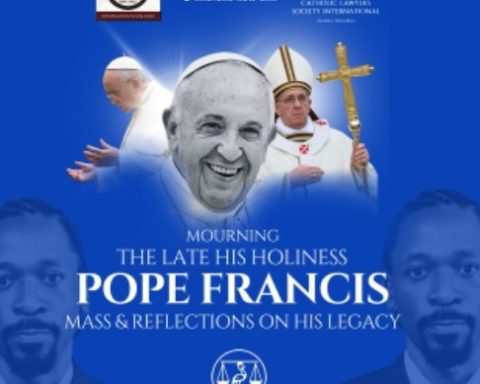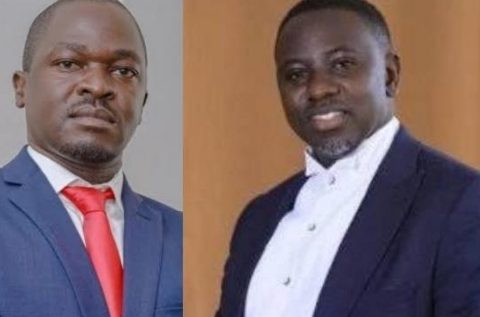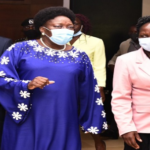A dramatic confrontation unfolded at the 2025 New Law Year event on February 7 when president of Uganda law society Isaac Ssemakadde forcefully took the podium after being unexpectedly removed from the list of speakers. His exclusion, ordered by Chief Justice Alfonse Owiny-Dollo, came amid accusations that Ssemakadde had previously insulted and demeaned the Judiciary. The Chief Justice insisted that unless Ssemakadde issued a public apology, he would not be granted a platform at judicial events.
Despite this, Ssemakadde seized the moment, delivering a bold and uncompromising speech that underscored his criticisms of Uganda’s legal system and its leadership.
Addressing the assembled dignitaries including the Prime Minister, government officials, members of the legal fraternity, and the diplomatic corps Ssemakadde did not hold back in his critique of the Judiciary. He argued that Uganda’s courts should not be above scrutiny, stressing that the institution exists to serve the public, not to demand praise.
“The Judiciary cannot insulate itself from the realities of the country,” he declared. “The courts exist not to be praised, but to serve. The Ugandan people, angered by corruption, inefficiency, and selective justice, have every right to express their frustration.”
He challenged the notion that public criticism of the Judiciary constituted an attack, arguing instead that it was necessary feedback from citizens whose taxes sustain the institution. He warned against the growing use of judicial power to silence dissent, particularly through contempt rulings, which he described as outdated remnants of colonial-era oppression.
Ssemakadde highlighted the recent Supreme Court ruling that outlawed the trial of civilians in military courts, calling it a step in the right direction. However, he pointed to ongoing injustices, such as the imprisonment of Ivan Ssebaduka a citizen jailed simply for voicing his opinion about the Judiciary as evidence that serious reforms were still needed.
“Justice is not a privilege; it is a right. A Judiciary that responds to criticism with repression only reinforces its own illegitimacy,” he asserted.
His speech also touched on Uganda’s overburdened prison system, arguing that incarceration was being used as a tool of oppression rather than justice. He announced a campaign to ensure that all Ugandans eligible for bail receive it, noting that this would help decongest prisons, reunite families, and restore public faith in the Judiciary.
Ssemakadde passionately defended his position as a member of what he termed the “Radical New Bar,” a movement committed to confronting injustices within Uganda’s legal and political system. He distinguished radicalism from extremism, arguing that radicals seek fundamental change by addressing problems at their root, while extremists simply push positions to their furthest limits.
“The Judiciary must not demand legitimacy—it must earn it,” he stated. “Suppressing public anger does not solve problems; it deepens them.”
As he concluded, Ssemakadde made it clear that he and his colleagues in the legal profession would not be intimidated into silence.
“The Uganda Law Society will not apologize. We will not be silenced. The Radical New Bar is not a moment it is a movement,” he declared.
Chief Justice Owiny-Dollo’s reaction was swift, expressing his frustration over what he described as persistent attacks on the Judiciary. He insisted that Ssemakadde’s past remarks about the courts were unacceptable and reaffirmed his stance that an apology was necessary before any form of engagement with him could continue.
However, Ssemakadde’s speech has reignited debate over judicial accountability and the limits of free expression in Uganda. Supporters hailed his boldness, arguing that his words reflected the frustrations of many Ugandans. Critics, on the other hand, accused him of undermining the integrity of the Judiciary with inflammatory rhetoric.
As Uganda moves forward into another legal year, the tension between the Judiciary and its critics remains unresolved, with calls for reform and greater accountability growing louder.
![]()

